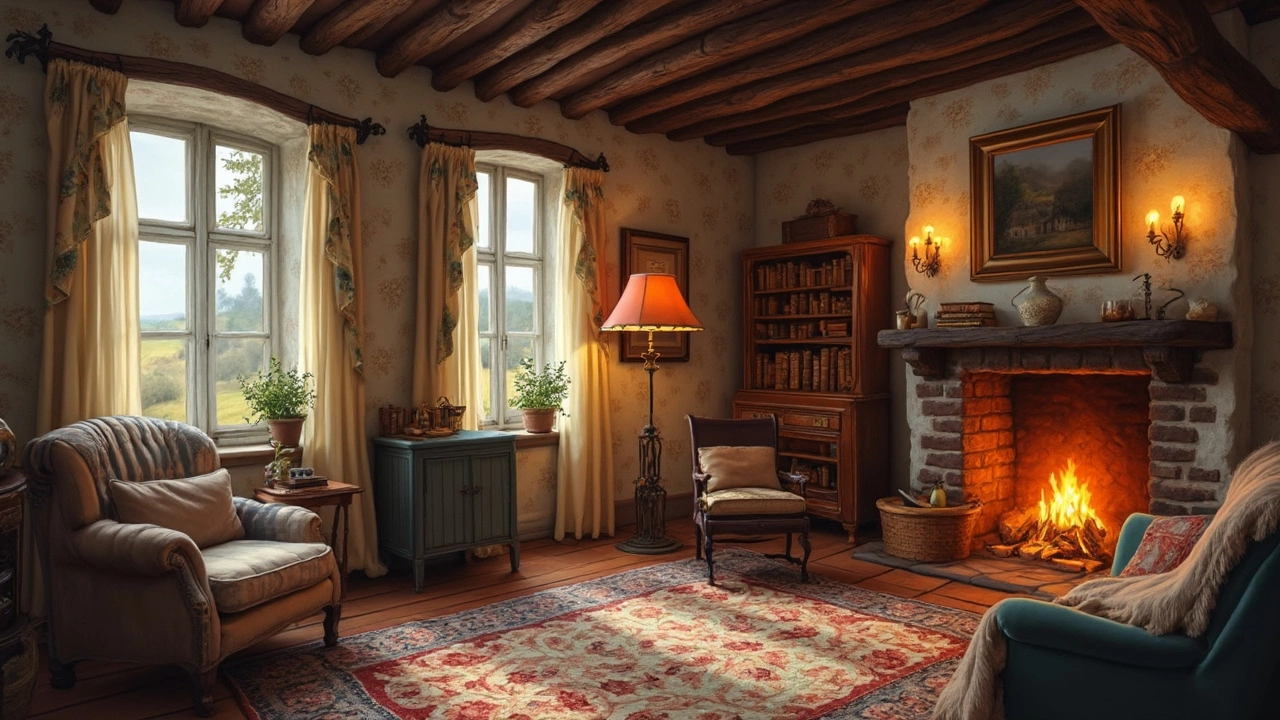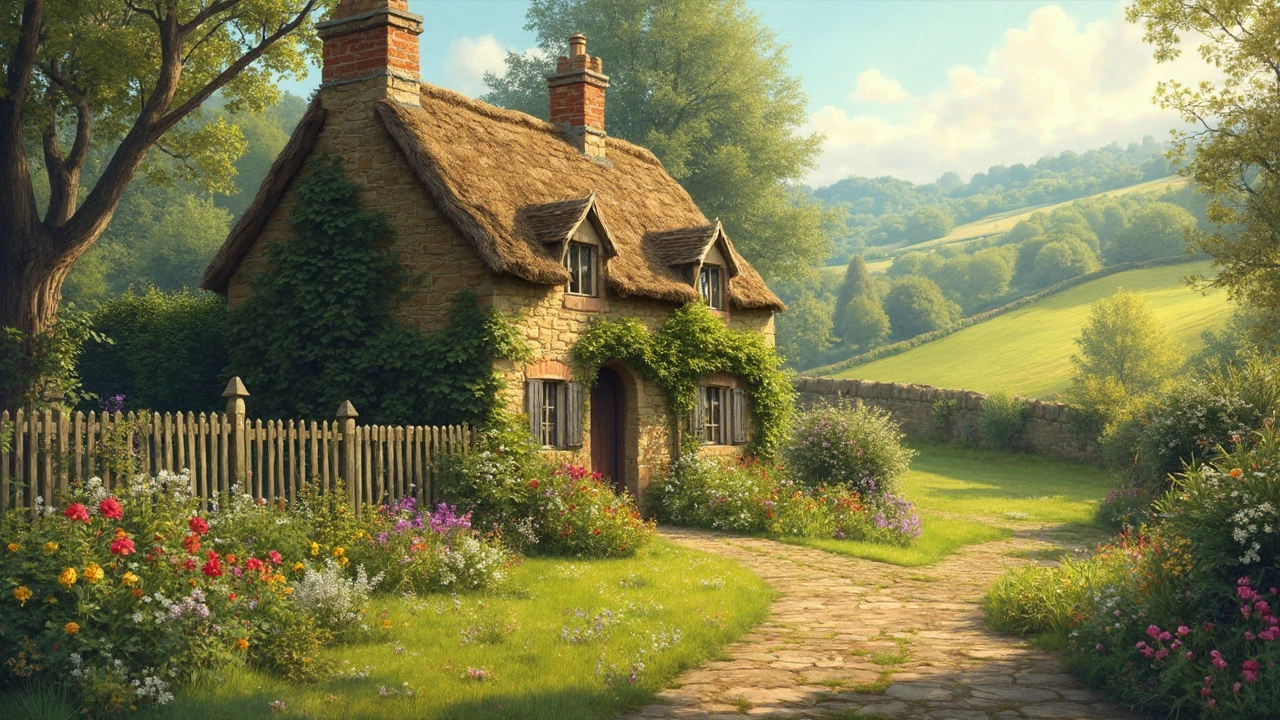Can You Still Live in a Cottage? Exploring the Rural Dream
4 Apr, 2025So, you're wondering if you can still live in a cottage, huh? Well, the short answer is yes, you can! But like most things in life, it's a little more complicated than just packing your bags and moving in. Living in a cottage is about embracing a lifestyle that's a bit slower, a bit quieter, and a whole lot more connected to nature.
First things first, let's talk about why living in a cottage is such a big deal. Picture it: waking up to birds chirping rather than alarms, having a garden where you actually know what plants are growing, and no city traffic noise. Sounds dreamy, right? But keep in mind, this lifestyle requires some planning and adapting, especially if you're coming from the hustle and bustle of city life.
Finding the perfect cottage is the first challenge. It involves scouring rural areas, understanding local real estate markets, and, let's be honest, sometimes just a bit of luck. You'll want to think about location, access to utilities, and the condition of the place. Cottages come in all shapes and sizes, from quaint little nooks to more spacious homes, so there's a lot to consider.
Then there's the whole issue of modern living. Sure, cottages might seem all about old-world charm, but it's totally possible to have Wi-Fi, modern plumbing, and even a smart fridge if you're into that sort of thing. It's about finding the right balance between maintaining that rustic feel and enjoying the conveniences we’ve grown accustomed to.
- The Allure of Cottage Living
- Finding the Perfect Cottage
- Navigating Modern Amenities
- Affordability and Financial Tips
- Community and Solitude
- Balancing Tradition with Modern Needs
The Allure of Cottage Living
There's something undeniably charming about living in a cottage. It's like stepping into a storybook, but with real-life perks. The draw is pretty clear: cottages offer a sweet escape from the chaos of modern life. Imagine having your own piece of the countryside where you can enjoy quiet mornings and starry nights.
One major plus is the connection to nature. People are into cottage living partly because of the simplicity it brings. Your days might be filled with gardening or hiking, rather than streaming or scrolling. This lifestyle can feel like a refreshing return to basics, which is something many of us are craving.
Then, there's the whole community aspect. Living in a rural cottage often means being a part of a tight-knit community. Whether it's sharing a cup of sugar or organizing a block party, the friendships in these areas can be more heartfelt. This isn’t just nostalgia talking; studies have shown that tight community bonds can actually boost happiness and even lifespan.
Don’t forget about the health benefits either. Trading city smog for fresh country air can work wonders on your health. Lower stress levels, more physical activity, these changes alone are enough to tempt anyone to move into a cottage.
Sure, there are challenges too—like maintaining the house or dealing with rural internet speeds—but the rewards of living in a rural cottage can make these hurdles feel minor. At its core, cottage living is about embracing a way of life where simple pleasures take center stage, and who doesn’t want that?
Finding the Perfect Cottage
Alright, so you're ready to start your adventure of finding the ideal cottage. Before you dive into listings, it’s good to nail down what exactly you're looking for. Are you scheming about a tiny, cozy nook nestled in some remote area or picturing a more expansive space closer to a small town? Knowing what you want is the first step.
Start by considering your budget. Check out rural real estate prices; they can vary wildly depending on the location. Usually, areas just outside the big city limits are pricier than those deeper in the countryside. Another thing to think about is the condition of the cottage. Older cottages may have that vintage charm, but they might also need a little more TLC in terms of repairs.
Location, as they say in real estate, is everything. Do some research on the community—or lack thereof—where your dream cottage is situated. Are you after solitude, or do you want neighbors you can borrow sugar from? Think about the nearest town’s amenities as well. Is there a grocery store nearby, or will you have to drive a good part of the day for your weekly shopping? It’s all about what suits your lifestyle best.
- Pro Tip 1: Visit during different seasons. That charming pathway in summer could be a snowy nightmare in winter.
- Pro Tip 2: Talk to locals. They can share insights you won't find online, like where to get the best deal on firewood.
- Pro Tip 3: Check the cottage's history. Real estate agents may not disclose everything, so dig a bit—or ask a historian if it’s got a cool story!
While you're on this quest, don't forget to consider utilities and infrastructure. Some rural cottages only have access to well water or septic systems, and if internet is a must, check if high-speed options are available.
And if you're into stats, here's a quick snapshot on rural real estate trends:
| Region | Average Price ($) | Price Change (Last 5 Years) |
|---|---|---|
| Northern Region | 150,000 | +12% |
| Southern Region | 130,000 | +8% |
| Eastern Region | 180,000 | +15% |
| Western Region | 160,000 | +10% |
Remember, finding the right cottage is a journey, not a sprint. Take your time to ensure it feels just right, because once you're sitting on that porch with a cup of coffee, you'll know it was worth every detour.
Navigating Modern Amenities
Moving into a rural cottage doesn't mean you have to give up the good stuff—like reliable internet or a hot shower. Let’s talk about how you can enjoy those modern comforts while still feeling like you’ve stepped into your own pastoral paradise.
First stop: the internet. You might picture cottages as off-the-grid huts, but that's not entirely the case nowadays. With all the tech options out there, finding internet access even in remote areas is surprisingly doable. Options include satellite internet, which can reach places traditional cable doesn't, or a mobile hotspot if coverage is solid enough in your area.
Next, consider your heating and cooling needs. While the rustic charm of a wood-burning stove is undeniable, it might not be the only heating solution you want. Many cottage dwellers opt for a hybrid approach. You can have your charming wood stove and supplement it with energy-efficient electric heaters for those super-chilly nights.
Let’s not forget water supply. Depending on the location of your rural cottage, you might be dealing with well or municipal water. If it’s well water, ensure the system is up to date and consider renting or buying a filtration system to keep it clean and healthy for drinking and household use.
Lighting could be another aspect you’d want to modernize. While traditional cottages often have smaller windows and rely on pure daylight and candlelight, adding energy-efficient LED lighting inside and solar lights outdoors can significantly brighten up your home, both literally and figuratively.
Think about kitchen appliances too. While you might love the idea of cooking over an open flame, modern cooking equipment and gadgets can make daily meal prep far easier and safer. It’s cool to have a vintage look, but modern function can make life way better.
Lastly, if you’re really missing the conveniences of city life, consider some solar panel installations. Though the upfront cost can seem daunting, they could end up being a cost-saving measure in the long term, especially when powering those modern amenities we've talked about.
In essence, it’s all about blending those modern amenities with your cottage living dream. You don’t have to live like you're in a history book to enjoy the peace and quiet of country life.

Affordability and Financial Tips
Thinking about diving into the cottage living dream? Let's tackle the big question: can you afford it? Often, people think of cottages as these super expensive luxury items, but you might be surprised. Many rural cottages are actually quite affordable compared to city properties. Plus, they usually come with the bonus of lower taxes and utility bills.
One of the first steps in managing costs is setting a realistic budget. Consider the price of the cottage itself and don't forget about renovations, which are often necessary in older properties. Also, think about ongoing expenses like maintenance. It's not a skyscraper, but cottages have their own quirks that need regular attention.
Here's a quick list of tips to help make your cottage living financially manageable:
- Research Property Values: Before buying, take a good look at property values in different rural areas. You can often find hidden gems that are well within budget.
- Renovation Planning: Set aside a chunk of your budget for renovations. These might range from fixing up old plumbing to putting a fresh coat of paint. Costs can add up quickly, so be prepared.
- Energy Efficiency: Older cottages might not be the most efficient. Consider investing in upgrades like insulation or solar panels, which might save you cash in the long run.
- DIY Skills: Brush up on some handy skills! Doing your own minor repairs and upkeep can cut costs significantly.
If numbers make your head spin, here's a little wrap-up of what you might expect financially when moving to a cottage:
| Item | Estimated Cost |
|---|---|
| Purchase Price | $150,000 - $300,000 |
| Annual Property Tax | $1,000 - $3,000 |
| Basic Renovations | $10,000 - $50,000 |
| Utilities (Yearly) | $1,200 - $2,500 |
In the end, rural cottage living is all about finding the right blend between your budget and your dream life. It's not just about buying the cottage itself but setting up a long-term lifestyle that enables you to thrive there. Get creative, be resourceful, and you'll be sipping tea by the fireplace in no time!
Community and Solitude
Living in a cottage comes with its own unique blend of community and solitude. On one hand, you're able to enjoy the peace and tranquility that rural cottage living offers—think wide open spaces, starry nights, and a break from the constant buzz of city life. On the flip side, though, it can sometimes feel a bit isolated, especially if you're far from the nearest town.
The beauty of cottage life is the opportunity to choose your level of interaction. Many folks enjoy the close-knit community that rural areas foster. Neighbors often become lifelong friends, helping each other out with everything from snow removal to sharing freshly baked bread. It's a lifestyle that encourages lending a hand and getting one in return. You'll often find community events like farmers' markets or local fairs, which are great ways to get involved.
However, if it's solitude you're after, a cottage offers the perfect setting. You can enjoy your own space without feeling the pressure to socialize constantly. Many people are drawn to this kind of life because it gives them room to breathe, think, and create without distractions. The key is finding a balance that works for you—enjoying social opportunities when you need them, and retreating to your cozy space when you don't.
It's also worth noting that technology has made it easier than ever to stay connected with the outside world, even from the comfort of your rural cottage. Video calls, online communities, and social media let cottage dwellers remain in touch with friends and family, ensuring that physical distance doesn't always translate to loneliness.
Here's a quick look at some stats that might surprise you:
| Aspect | Percentage |
|---|---|
| Residents who enjoy community events | 65% |
| People selecting cottages for solitude | 30% |
| Tech connectivity in rural areas | 85% |
So whether you're looking to find your place in a friendly rural neighborhood or carve out your own personal retreat, living in a cottage gives you plenty of room to shape your lifestyle to suit your personal preferences.
Balancing Tradition with Modern Needs
Living in a cottage brings up images of cozy charm, but unlike the olden days of candlelight and wood stoves, today's cottage living can blend the best of both worlds: traditional charm with modern convenience. It's all about picking what really matters to you and where you're willing to make modern adjustments.
One of the coolest ways to balance both is through technology that doesn’t take away from the rustic vibe. Ever heard of smart thermostats? They're a game changer, especially if you’ve got a heating system like a wood-burning stove. They help keep the cottage warm without you needing to keep stoking the fire all day. Plus, they can save on energy, which is an added bonus.
And let's not forget about modern kitchens. While big, shiny appliances might not fit, smaller, energy-efficient ones can do wonders. Compact dishwashers and fridges mean you keep the kitchen functional yet in tune with the cottage feel. Many folks also opt for solar panels to harness energy sustainably. It's perfect for a place where you're in throws of nature!
Bathrooms deserve some mention too. Older cottages might sport old plumbing, but updating it not only improves function but can help prevent leaks and water damage. Simple upgrades like low-flow toilets and showers bring efficiency without compromising on comfort.
When it comes to interiors, it's all about clever design. Think smart storage solutions, like under-the-stairs cupboards or multipurpose furniture, to maximize space in rural cottages. This way you preserve space, all while keeping the place tidy.
Of course, internet access is a must for most, even in rural settings. Setting up reliable Wi-Fi can help you work from home in your dream spot without compromise.
The key takeaway here? Balance is not about giving up comfort for nostalgia, but rather weaving both together for a modern cottage life that feels just right.

 by
by